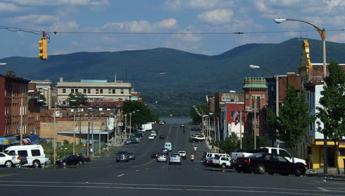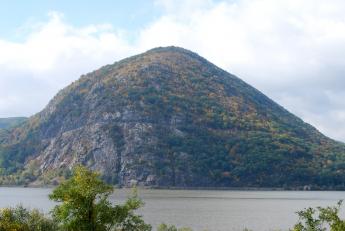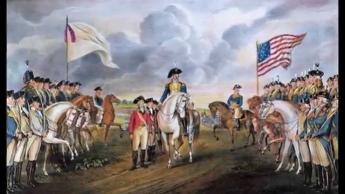Related Topics
Connecticut Invades Pennsylvania!
Connecticut once waged three serious wars with Pennsylvania, and we don't even remember it. But politicians noticed that all became peaceful after we united into a single nation. Others noticed the Articles of Confederation were strong enough to cope with invasions by neighbor states. The two proprietorships of New Jersey taught some smaller lessons. Virginia taught still other lessons.
Litchfield to Wilkes Barre, Today
The journey of Connecticut's invasion path into Pennsylvania has changed little in two centuries. But some pretty important history has since taken place along that route.
The Pennamite Wars
The Connecticut farmers believed the King's last word overturned all earlier ones, else why be a king? William Penn's revolutionary idea was that of private property -- the first sale created a new owner, whose new word erased any earlier ones. When you acquire a new continent from aborigines, that's a congenial viewpoint.
Newburgh NY: Washington Slept Here

|
| Newburgh, NY |
A silhouette map of the Hudson River from top to bottom shows several stretches of narrow river between several other wide stretches, almost like lakes. The narrows reflect the places where mountain ranges broke apart to let the river through, and the lakes are places where the water backed up until it got high enough to flow through the gorges. There's not much water pressure since the Hudson at the mouth of the river at New York Bay is only a few feet deeper than it is at Albany. Ben Franklin was the first to observe that the Hudson and Delaware are not exactly rivers; they are more like fjords, tidal up to Poughkeepsie and Marcus Hook, respectively. The Dutch had a settlement at New Amsterdam, of course, but there was another settlement around the Tappan Zee, and another cluster above West Point. Kingston was the dominant town of this upper settlement, but the British had burned it to the ground after their defeat at Saratoga in 1777. In 1782, Washington chose Newburgh to be his headquarters, where he remained for 16 months, the longest headquarters interval during the eight-year guerilla war.

|
| Storm King Mountain |
As always, Washington made excellent use of geography. The Storm King Mountain and West Point to its south narrowed the water route to New York down to a defensible defile. On the east side of the Hudson, the towering ridge not only protected the encampment from surprise but provided a lookout point at Beacon, where television towers now stand. The land is broken and semi-mountainous on the east side of the Hudson, all the way into Connecticut; an extension of difficult terrain which on the south crosses the Hudson and extends west into New Jersey. Reduced to its essentials, the British in New York and Washington in Newburgh were separated by a mountain range with a Hudson River water gap running through it. Immediately to the west beyond Newburgh however, the land is fairly flat until it rises to the watershed of Delaware. Washington could defend the Hudson against the British Navy at the narrows, eventually blocking the channel with a chain which was sufficient barrier to sailing vessels if they were vulnerable to cannon fire from the shore. If there was a land attack sweeping around behind Newburgh, Washington could escape by sailing up the Hudson; in that case, he would have boats and the pursuing British Army wouldn't. Such a daunting natural fortress was adequate for his situation since the British were equally reluctant to sustain casualties in frontal assaults so late in the war unless victory was fairly quick and easy. This was the general issue underlying the Benedict Arnold affair: blocking the British Navy from making a landing north of the watergap.

|
| Battle of Yorktown |
After the battle of Yorktown, the British could see there was no hope of subjugating large colonies using armies mostly supplied by sea. The Revolution settled down to attrition at sea, but the American privateers were winning that, too. Eventually, more British were lost to privateering than to warfare on land. The colonies were learning how to supply themselves with manufacturers, while the British were losing substantial amounts of trade with other parts of the Empire. Franklin in Paris was counting on Washington to maintain a credible threat; Washington was counting on Franklin to drive a hard bargain, but hurry up, please, our troops haven't been paid and are restless. The privateers were both suffering and inflicting appalling losses at sea, but their owners were getting rich. Most of the early great fortunes of Federalist America trace their origin to privateering. All of these emerging realities presented a bleak future to the British, and Franklin was masterful in rubbing it in. But if Washington lost control of his little army, a great deal more would be lost at the treaty negotiations.
Originally published: Thursday, September 02, 2010; most-recently modified: Wednesday, May 29, 2019